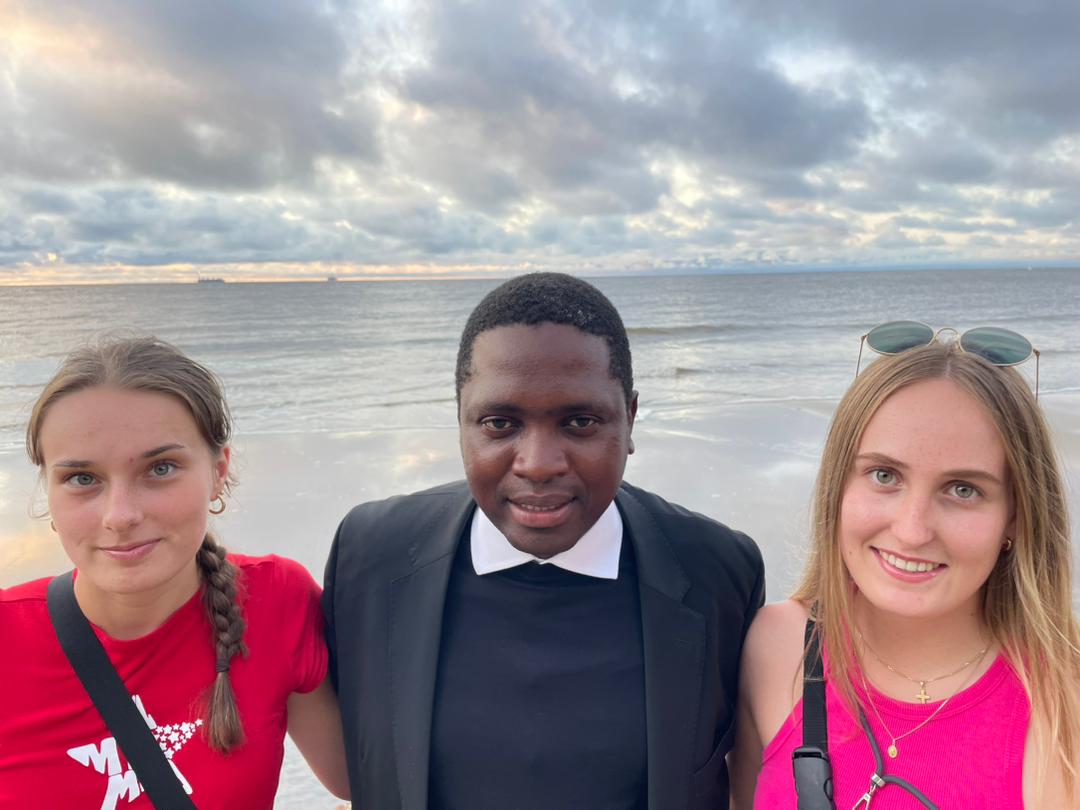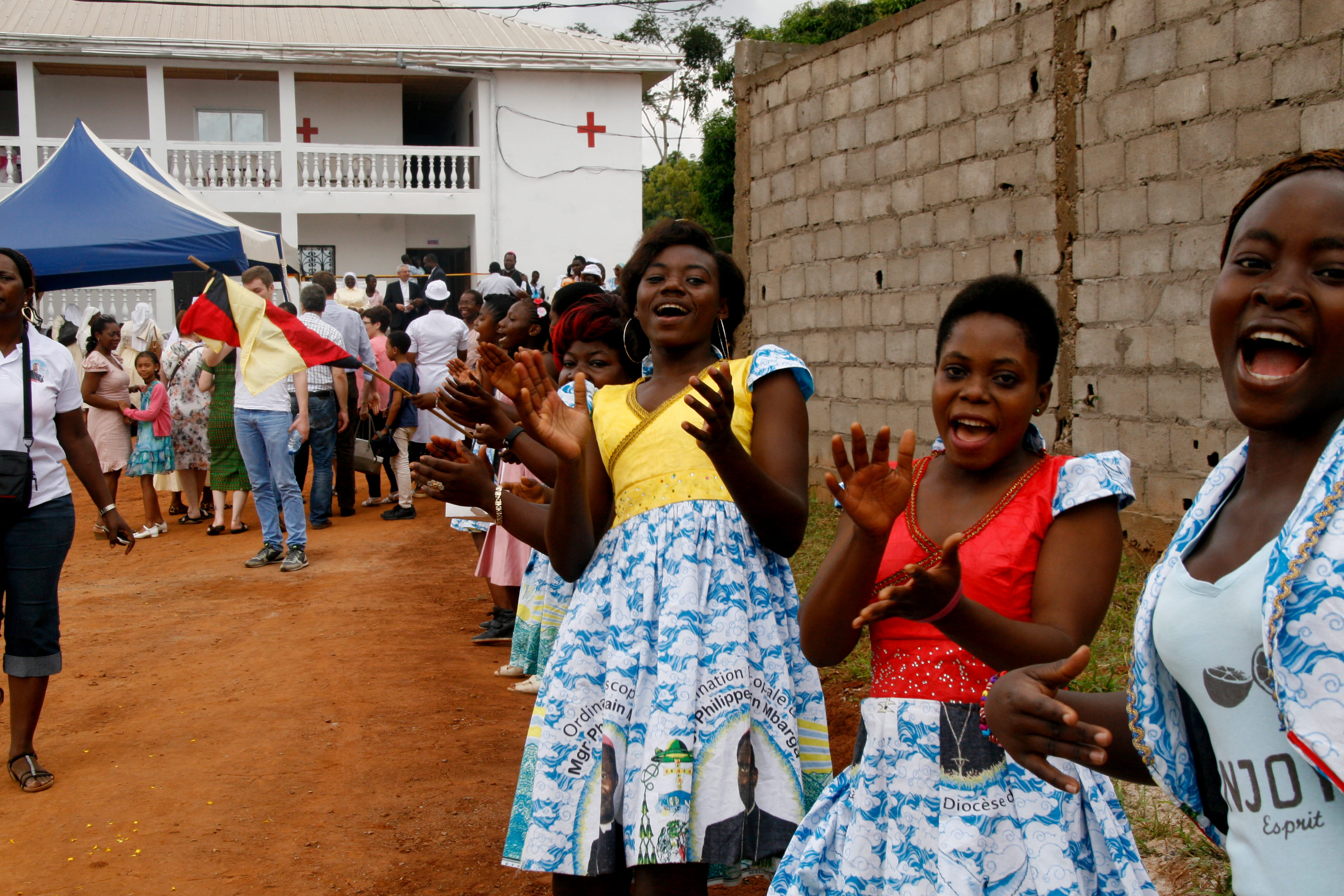Travel Report – Support Association
On August 22 of last year, Celina and I embarked together on our big journey to Cameroon.
After two flights and countless minutes of delay, we finally arrived in Ébolowa, the capital of the South Region of Cameroon.
For our almost six-month stay, Philippe, Bishop of the Diocese of Ébolowa and at the same time representative of the Support Association here in Cameroon, provided us with accommodation – or rather, an entire floor – on the premises of the Diocese.
After overcoming the initial culture shock and slowly settling in bit by bit, we first went together with Father Bruno for three days to Kribi.
The coastal town, about two hours from Ébolowa, offers not only paradisiacal beaches and small, dreamy fishing villages but also incredibly delicious fish.
This fish is caught in small wooden boats from the Atlantic and prepared fresh right on the beach.
You can then enjoy the grilled fish with fried plantains or Bâton de Manioc on the beach during sunset.
After three days on the most beautiful beach in the world, we then traveled back through adventurous routes deep into the bush of Cameroon, where we could finally begin our internship – the real reason for our trip.
The internship started for us on Monday morning at 7:00 a.m. at College Bonneau, a Catholic private school of the Diocese, just a short distance from our house.
This day began, as every Monday does, with the weekly flag ceremony and a speech from the principal.
Seeing nearly all 600 students of the college, dressed in uniform school outfits, lined up neatly in rows on the schoolyard, singing the national anthem while being strictly observed by a Discipline Master, was very strange and unfamiliar at first.
A Discipline Master – a person whose task is to ensure that all students comply with the school rules at all times – is common here and present at every school.
Together with subject teachers, we attended English and German classes of various grades and were eventually allowed to prepare and teach our own lessons.
We quickly realized that school life for teenagers and children here is very different from that in Germany.
Starting with the Discipline Master and the extreme obedience, the numerous subjects and corresponding number of exams – all of which are taken within a single week – to a school day that lasts eight and a half hours – every day of the week.
To gain even more impressions, we continued our internship at the Nko’vos kindergarten, located in the city center of Ébolowa.
This kindergarten is bilingual, consisting of an Anglophone and a Francophone section.
At that time, however, Nko’vos was in a state of emergency because the old kindergarten building was dilapidated and no longer safe.
Therefore, all groups were relocated to an empty church building.
There, almost 100 small children aged 2-4 gathered together.
The noise level was enormous, and the caregivers tried every possible means to keep the children occupied and somehow entertained.
This proved to be a real challenge due to the lack of toys.
Neither in the old church building nor now in the new building – which was just recently inaugurated by Bishop Philippe – was any playground equipment available.
The individual group rooms only consisted of seating for the children, a desk for the caregivers, and a blackboard.
There was no trace of toys, the most essential equipment of a kindergarten.
Well, we did our best to support the caregivers and to entertain the children with various dances, such as the “Fliegerlied” or “Head and Shoulders, Knees and Toes.”
After about six hours of child care without toys, our nerves were quite frayed.
We completed the final part of our internship at the Abang primary school – also a private institution of the Diocese, located next to the Cathedral.
There, we split up into different classes:
Celina spent the remaining time with the second grade, while I was with the sixth grade.
Children in Cameroon attend primary school for six years before moving on to college.
Here too, we were able to gather many interesting impressions, experience firsthand what life is like for children in Cameroon, and above all, improve our French.
Just like at the college, all students wear a school uniform, pray the Angelus exactly at 12:00 p.m., and start each school day with a flag ceremony.
Many things work very differently here compared to Germany, and correspondingly, the differences in the school system are vast.
Perhaps it was precisely these great differences that made the internship so exciting and enriching.
All in all, it was a very beautiful, successful, and impressive internship, during which we were able to get to know the lives of children, teens, and young people more closely and gain very special insights.
We were warmly welcomed everywhere, had wonderful encounters, and were able to meet many new people.
Of course, during this time we also became aware of certain issues.
What stood out negatively in all educational institutions was the lack of play, sports, and leisure equipment.
Whether among the small children in kindergarten, who have nothing to play with except a tiny chalkboard, or among the children in primary school and college, who have to play soccer with an empty bottle because there are neither balls nor goals.
We have already donated a new playground – funded through collected donations – to the Abang school complex, consisting of the primary school where we completed our internship and an adjoining kindergarten, as well as to the Nko’vos complex.
Hopefully, it will be completed before our departure in February so that we can inaugurate it ourselves on site.
The joy of the children, even just at the news that a new playground would soon be installed, was immense.
Likewise when we donated new soccer balls to the primary school – also financed through donations.
Purchasing the balls and renovating the two playgrounds was a great first step to keeping the kindergarteners busy throughout the day and the primary school children during breaks.
However, this is by no means sufficient, as the need for play equipment is truly great and, as already mentioned, lacking in almost all complexes.
Therefore, it is truly a heartfelt wish of ours to gradually acquire more toys, balls, soccer goals, and outdoor games – to give the children activities and bring them joy.
To realize this project, however, we depend on your donations and the support of the Support Association.
Every little donation helps to support and implement projects like this and to do something good for others.
Ébolowa, January 10, 2024
Josephina Schäfer

